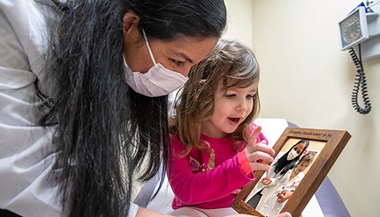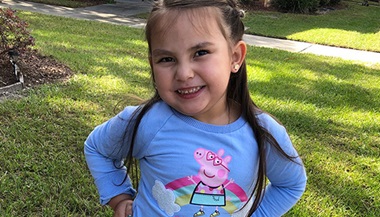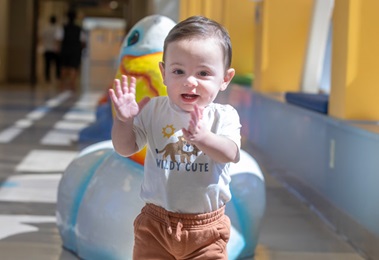Patient Story
Esophageal Atresia: Saylor's Story
Patient Story Highlights
- Saylor, born prematurely at 31 weeks, is diagnosed with tracheoesophageal fistula and esophageal atresia.
- She is transferred to Johns Hopkins All Children's Hospital for specialized care from the Esophageal and Airway Treatment (EAT) program.
- Dr. Jason Smithers and the EAT team treat Saylor's complex medical issues through several surgical procedures.
- Saylor's mother, MaryBeth, praises the medical staff for their involvement, communication, and expertise.
- After multiple surgeries and hospital stays, Saylor is discharged and her lung issues are improving at home.

The medical team was all smiles when Saylor was discharged from the neonatal intensive care unit (NICU) on May 9 and headed home for the very first time. Saylor was born Dec. 30, prematurely at 31 weeks in a south Florida hospital. She was diagnosed with tracheoesophageal fistula and esophageal atresia and was transferred to Johns Hopkins All Children’s Hospital in St. Petersburg, Florida, on Feb. 9 by the hospital’s LifeLine Critical Care Transport Team, which provides round-the-clock specialized transport care to critically ill newborns, infants, and children, after it was determined she needed special medical care from the hospital’s Esophageal and Airway Treatment (EAT) program.
Esophageal atresia occurs when a baby’s esophagus (the tube that connects the mouth to the stomach) does not develop properly. It affects a baby’s eating and breathing. It is somewhat rare, impacting 1 out of every 3,000-4,000 births. The Esophageal and Airway Treatment program at Johns Hopkins All Children’s Hospital specializes in treatment for infants, children and young adults with complex esophageal and airway problems.
“It’s been a long and complicated road,” says Saylor’s mom, MaryBeth. “She needed emergency surgery within the first 24 hours of her life. She had a rough time and did not seem to be recovering. I asked around and looked online to see who would be the best to treat her condition. After some searching, we found Dr. Jason Smithers and the EAT program at Johns Hopkins All Children’s Hospital. That was a game changer for us. He determined she had severe tracheomalacia, which caused her windpipe to collapse. As soon as she was stable enough, she ended up having another 12-hour surgery.”
“Saylor was dealing with several medical issues when she arrived here,” Smithers says. “In addition to esophageal atresia, she was suffering from chronic lung disease related to prematurity. She also had a floppy trachea that was collapsing a lot.” Through several surgical procedures, Smithers and the EAT team were able to put Saylor on the road to recovery.
“Throughout her stay at Johns Hopkins All Children’s, I was nervous and a little scared, but also felt very comfortable because the medical staff always involved me in daily rounds. They all spoke with me, not at me. The entire team made me comfortable and confident in Saylor’s care and treatment plan,” MaryBeth says. “Dr. Smithers has also been available whenever I had questions.”
“On the day she was discharged, I got special T-shirts for the doctors and nurses. The shirts have a quote from Shakespeare, “Although she be but little, she is fierce.” She has had a lot to deal with and has always pulled through,” she says.
Shortly after Saylor was discharged in February, she was readmitted for more surgery. Today, she is at home. While still on oxygen, her lung issues are improving. “Hopefully, in six months to a year, she will be off the oxygen,” MaryBeth says. “Her outlook for a healthy life is a good one, thanks to the team at Johns Hopkins All Children’s.”






